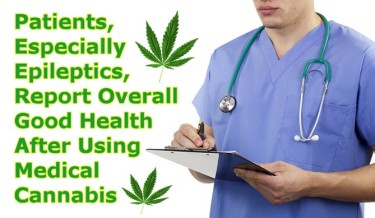Epileptic Seizures Drop by 86% with Whole-Plant Cannabis Extracts in New Medical Study
[ad_1]
A small study conducted on children with treatment-resistant epilepsy has discovered that whole-plant cannabis therapies relieved seizures up to 86%. This study was recently published by the journal BMJ Paediatrics Open.
To carry out the study, retrospective clinical data was collected by researchers from clinicians and caretakers of 10 children with drug-resistant epilepsy. The researchers ensured that the 10 patients recruited for the research had not responded to any CBD products. The children recruited were of the average age of six but ranged between 1 to 13 years. These kids had a range of epilepsies and various kinds of co-existing issues like learning abilities, global developmental delay, and infantile spasms.
The research ensued and the patients were administered a whole-plant cannabis oil that contains CBD, THC, and other cannabinoids. Compounds like flavonoids and terpenes were also present in the whole-plant cannabis oil. After the study was conducted, the frequency of the patients’ seizures was recorded to reduce by nearly 90%.
The authors of the research officially reported that the frequency of seizure across all 10 patients was reduced by 86% with no adverse side effects recorded. Each of the patients’ doctors determined the dosage of cannabis oil administered to the kids. On average, the children of each of the patients received roughly 5mg of THC every day, although no patients got high from the education.
Parents were also involved in the study as they reported results to the researchers either through video conference or phone calls. Some side effects such as excessive tiredness were initially recorded before precise dosing was established. Research on which marijuana strains are best for epilepsy has been going on for years in legal states.
One of the study authors, Rayyan Zafar, reported that all parents noted the children adequately tolerated the whole-plant cannabis products. The parents affirmed that there were noticeable improvements in their behavior, mood, and as well as cognitive abilities.
The study also proves that the use of whole-plant cannabis oil resulted in a drastic reduction in the use of other prescription drugs by the patients. At the beginning of the study, patients were on several daily medications, a figure which drastically reduced once treatment with cannabis oil began. The researchers reported that the use of antiepileptic drugs by the patients reduced from an average of seven to one once treatment with cannabis oil began.
Researchers Support Improved Access to Cannabis Therapies
In 2018, Sajid Javid, the U.K. Home Secretary, (presently the Secretary of State for Health and Social Care), declared that medical cannabis would be made accessible to patients. However, only a handful of patients have received cannabis medications from the National Health Service.
The authors of the research also noted the financial implications of the study. They reported a total cost of £874 every month to purchase these cannabis medicines via private descriptions. The authors believe that the study has provided enough data on whole-plant cannabis therapies. They believe these data can serve as evidence for the NHS to introduce such medications under the present prescribing guidelines. The authors affirmed that such a move will have a huge impact on families looking after their seriously ill kids. Such a move by the NHS will save families from the financial burden linked with medications including the psychological stress experienced from taking care of the kids.
Parents Cautioned Against Unsupervised Cannabis Treatment for Seizures
The spokesperson for the American Epilepsy Society, and a neurologist at the Phoenix Children’s Hospital, Dr. Kevin Chapman, gave parents a strict warning. He asserted that parents should not try any form of self-medication on their children with cannabis oils. He affirmed that the product is still “buyer beware”. In his words, adequate evidence is still lacking in support of using cannabis products in substitute to prescribed epilepsy treatments.
The authors of the research have admitted that there are some risks associated with treating children with psychoactive compounds. However, they also noted that the usual epilepsy medications also have severe side effects. A primary care doctor at Massachusetts General Hospital in Boston, Dr. Peter Grinspoon made some important comments. He pointed out that worries about the side effects of cannabis therapies on children should also be considered in the context of risks linked with other generally used medications.
Grinspoon during an interview with UPI also affirmed that the general skepticism about the use of THC among children should be in parts. And these parts should be pacified by a reduction in the use of anti-epileptic drugs, many of which have severe side effects. He said that it is easy to see why parents actively support the use of cannabinoids for the treatment of epilepsy in children.
Researchers of the study also reported that a blend of cannabis oil and individual dosage was adapted to each patient by their physicians. Each of the patients was also instructed against administering the medication without adequate supervision.
Zafar also mentioned that medical oversight is very crucial. The researchers have encouraged parents with kids suffering from treatment-resistant epilepsy to approach clinics. They can then discuss the cannabis treatment plan with their doctors.
Several constraints and limitations of the study were also identified by the authors of the study. These limitations include the use of retrospective data and data reliant on caregiver recall. However, during the study, parents usually keep diaries for documenting seizures as they occurred. The authors also remarked that there was no randomization in the research. Furthermore, a placebo group was also not included in the research to which results are compared.
The researchers also mentioned that the small sample size of the experiment was also a limitation in itself. However, they pointed out that the results were also uniform with other studies. The researchers have also asked that further studies into whole-plant cannabis extracts as a treatment for epilepsy and resulting seizures be carried out.
Conclusion
Certainly, this small study has shed new light on the benefits of cannabis extracts and products. Hopefully, the NHS will consider cannabis products under the present prescription guidelines. If not for anything, but the sake of the families with kids suffering from treatment-resistant epilepsy.
MORE ON MARIJUANA AND EPILEPSY, READ THESE…

WHOLE PLANT CANNABIS FOR EPILEPSY, PATIENTS APPROVE!
OR..

EPIDOLOX APPROVED BY THE FDA, CANNABIS-BASED MEDICINE!
[ad_2]
